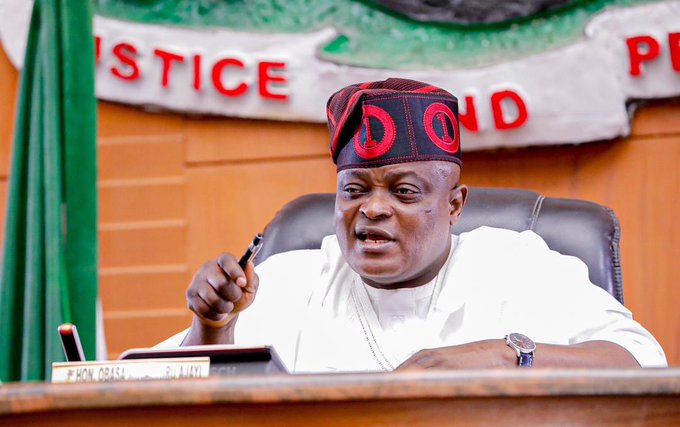Speaker of the Lagos State House of Assembly, Mudashiru Obasa, has said that the proposed N4.237 trillion 2026 budget must focus on real needs of Lagos residents and help build a more inclusive and resilient state. Obasa made the remarks on Tuesday during the formal presentation of the 2026 Appropriation Bill to the Assembly by Governor Babajide Sanwo-Olu.
The governor submitted the N4.237 trillion spending plan, which he described as the “Budget of Shared Prosperity,” to lawmakers for consideration and approval. The ambitious proposal comes at a time when Lagos, Nigeria’s commercial capital, is working to sustain growth despite national economic challenges, rising living costs, and pressure on infrastructure due to its fast-growing population.
In his response to the budget presentation, Speaker Obasa stressed that the financial plan must reflect the genuine needs and aspirations of the more than 20 million people who live and work in Lagos.
According to him, the budget should serve as a tool to strengthen economic resilience, improve welfare, enhance security, and support sustainable infrastructure development across all parts of the state, including the rapidly expanding suburbs.
“This budget must address the urgent social and economic challenges facing our people,” Obasa said. “We need a plan that truly improves lives, expands opportunities, and ensures that every community feels included in the growth of Lagos.”
The Speaker explained that Lagos did not become one of Africa’s leading economies by chance, but through years of strategic planning, hard work, and policies that promote innovation and excellence.
Obasa, who has led the Assembly for nearly a decade, highlighted the legislature’s track record during his tenure. He said that over the past 10 years, the House of Assembly has passed more than 100 laws and over 1,500 resolutions aimed at strengthening governance and improving the quality of life for residents.
These laws include reforms in areas such as transportation, environmental protection, education, revenue administration, housing, and public safety. Many of the laws were designed to support Lagos’ rapid growth and help the state respond to urban challenges like traffic congestion, flooding, population pressure, and rising demand for public services.
The Speaker noted that the Assembly has consistently partnered with the executive arm of government to drive development. He said the strong cooperation between both arms has allowed Lagos to remain ahead of many other states in terms of infrastructure, revenue generation, and administrative reforms.
Obasa praised Governor Sanwo-Olu and his team for presenting a detailed and comprehensive fiscal plan, saying it reflects Lagos’ commitment to inclusive development and long-term prosperity.
He also commended the governor’s “prudence and resilience,” especially in managing the state’s resources during tough economic times. Despite inflation, high costs of living, and national fiscal pressures, Lagos has continued to invest in major projects such as roads, bridges, waterways, public transportation, schools, and hospitals.
“Our progress is built not on arrogance but on collective effort and a forward-looking vision,” Obasa said. “These are the principles that must guide the decisions we make on the 2026 budget.”
The Speaker said that Lagos’ success is tied to its unity, diversity, and strong planning culture. He emphasized that inclusive policies and respect for human freedom have played an important role in building trust among residents.
He added that this sense of unity must continue to guide the Assembly as it reviews the 2026 budget. According to him, the budget should not only focus on major urban centres but must also address the needs of rural and developing communities in the state.
Obasa noted that the proposed budget prioritises several critical areas:
Healthcare: To improve access to quality medical services and expand ongoing health infrastructure projects.
Education: To support growth in primary, secondary, and tertiary institutions, as well as address student population increases.
Transportation: To strengthen the state’s multi-modal transport system, including road rehabilitation, bus services, rail development, and water transportation.
Security: To improve safety across communities, support security agencies, and reduce crime.
Governance: To enable effective service delivery, strengthen institutions, and support reforms.
These sectors, Obasa said, are essential to Lagos’ long-term development and must be carefully considered to ensure maximum impact.
The Speaker reminded lawmakers that their main responsibility is to ensure that the budget works for the people of Lagos. He urged them to carry out a thorough review of the proposed allocations and ensure that every sector receives the resources needed to deliver meaningful results.
He said the Assembly will not approve projects or spending that do not align with the state’s broader development agenda or fail to address the needs of residents.
“Lawmakers must examine every detail of this budget,” Obasa said. “Our duty is to make sure it serves the collective interest of Lagosians.”
Obasa also expressed appreciation to President Bola Tinubu, whom he described as a leader whose reform agenda has brought noticeable improvements at the national level.
Tinubu served as Governor of Lagos State from 1999 to 2007 and is widely credited with laying the foundation for many of the reforms that helped Lagos grow into one of Africa’s largest subnational economies. Obasa said the President’s “Renewed Hope Agenda” is helping strengthen national institutions and supporting states like Lagos to pursue ambitious development goals.
With the presentation completed, the Lagos State House of Assembly is expected to begin its budget review sessions. Committees will invite commissioners and heads of agencies to defend their budget proposals.
The Assembly usually holds several weeks of discussions, stakeholder forums, and public hearings before making adjustments and passing the final Appropriation Bill.

